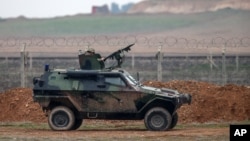Recent victories by the Syrian opposition are being attributed to a newfound unity among Saudi Arabia, Turkey and Qatar. Opposition parties in Turkey are not happy with the efforts between the countries, however, accusing the government of preparing to intervene militarily in Syria.
Turkey's foreign ministry has confirmed it is working closely with Saudi Arabia in supporting Syrian opposition groups.
Until recently the two countries had been at loggerheads over Ankara’s backing of the Muslim Brotherhood, but in the past few months Qatar, a key Turkish ally, reportedly has mediated a rapprochement.
Paradigm shift?
Carnegie Institute in Brussels visiting scholar Sinan Ulgen said that could be a game changer.
"There is now a deepening collaboration with Saudi Arabia on Syria, [in] the previous position both countries have supported different factions on the ground," said Ulgen.
"What has changed [is] a newfound agreement to join forces and certainly there have been claims that this improved cooperation between Ankara and Riyadh has allowed these opposition groups to gain the upper hand in Syria, capturing Idlib for instance and possibly preparing an assault on Aleppo," said Ulgen.
Some observers say the deepening collaboration between Riyadh and Ankara could lead to a direct military role in Syria. Ankara repeatedly has called for the creation of safe haven areas in Syria for refugees and to give opposition forces an operating base.
Turkey's government has said it will not intervene unilaterally and its Western allies have refused to back such an intervention. International relations expert Soli Ozel of Istanbul’s Kadir Has University said that may change.
"To the best of my knowledge they still do not look very favorably on that option and I am not sure Turkey can do it on their own. But the Americans are not vocally opposing it," said Ozel. "Americans, because they are negotiating with Iran that upsets the Saudis a lot, are trying to assuage the Saudis and let them do whatever they want in Syria, and of course that includes cooperation with Turkey against the regime, as well."
Military speculation increases
A leading member of Turkey’s main opposition has claimed a military operation is imminent, fueling speculation in Turkish media.
But analyst Ulgen say there are strong reservations within the Turkish army.
"The military would be cautious, especially in an environment when the exit strategy is unclear. Let us recall that Turkey has been very critical of the U.S. intervention in Iraq," said Ulgen. "One of the points of criticism is the inability of Washington to clarify the exit strategy form Iraq. And that was exactly the lesson drawn by the Turkish military."
Turkey is in the midst of a general election and all the opposition parties oppose intervention in Syria, and there also appears to be little public support.
But diplomatic columnist Kadri Gursel of Turkey’s Milliyet newspaper and Al Monitor website, said collaboration with Saudi Arabia threatens to widen the sectarian divide between Sunni countries like Saudi Arabia and Shiite Iran.
This is a sectarian position, Turkey sided with the Sunni camp. Turkey giving support to [a] Saudi military endeavor in Yemen and taking sectarian policies will provoke reactions from Tehran," said Gursel. "And this reaction ... we can not definitely predict. I do not expect Tehran will just sit and watch what Turkey is doing in surrounding regions."
Analysts predict those strains are expected to grow with Ankara’s new found collaboration with Riyadh, especially if it continues to result in military successes for Syria's opposition.










